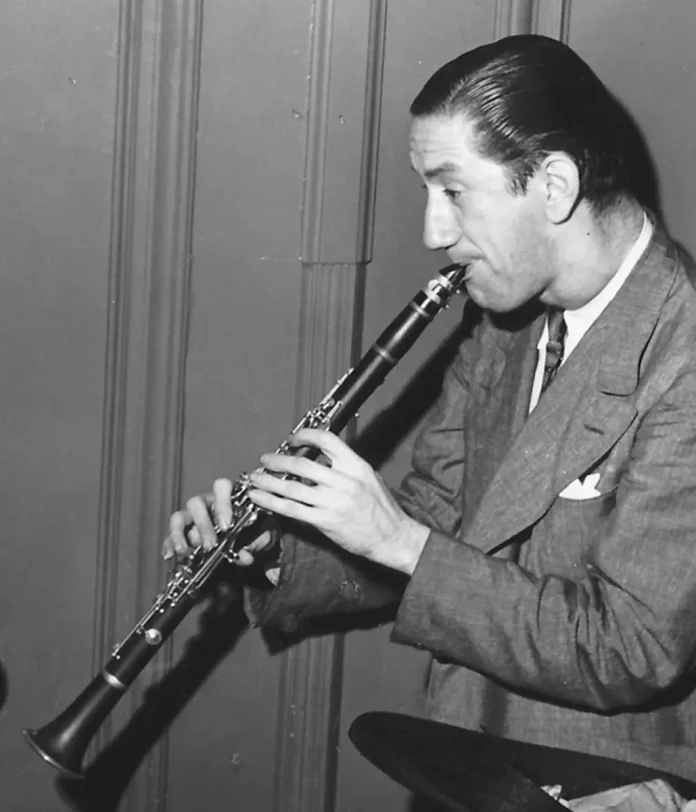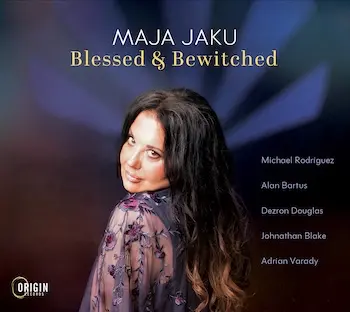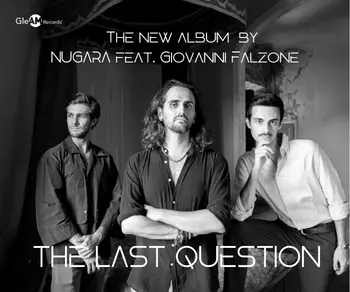This is one of a series of taped interviews with musicians who are asked to give a snap opinion on a set of records played to them. Although no previous information is given as to what they are going to hear, they are, during the actual playing, handed the appropriate record sleeve. Thus in no way is their judgement influenced by being unaware of what they are hearing. As far as possible the records played to them are currently available items procurable from any record shop. Charles Ellsworth ‘Pee Wee’ Russell, is one of those musicians who is not afraid to speak his mind, and whose opinions are as forthright as is his music. In style and approach, his plaintive timbre and use of ‘dirty’, slurred passages to implement the force of his playing, are as unique as anything that has ever come up in jazz. A distinctive musician, with an eccentric charm all his own. – Sinclair Traill
Deep Purple. Woody Herman ’64. Philips BBL 7608
Nat Pierce is one of my closest friends – a great guy. I don’t think he ever really worked with anyone except Woody. Used to gig around Boston, but never played with a band regularly. There is a great deal of Basie in his playing, but he does have a style of his own, tho’ he doesn’t get much chance to show what he can do. I have used him for record sessions. That thing we did for Candid, with Coleman Hawkins and young Brookmeyer is one of my own personal favourite recordings. Nat plays his best on that. You said you liked Mariooch from that album, well it was for my wife, so I tried my best; and the harder you try, the luckier you are – always supposing it comes off, that is.
That is a great band Woody has – he always gets a good band together. Trains them hard, very hard. But the real boss behind the band is Nat – he is the Woody Herman band. He hires, fires and does everything else. Maybe when Woody retires, Nat will take over, in the same way that Woody took over from Isham Jones. I was playing with Louis Prima in Hollywood when that happened. Prima was starting a big band, and Woody lent me a couple of arrangements. I think they came from Isham Jones, who had a very good dance band with some nice arrangements by people like Don Kincaide and Joe Bishop. Prima had a nice showband, but I didn’t stay long – I don’t like big bands – I only stayed about three months, then quit – couldn’t stick it! I have never liked big bands, you are too regimented. Not that I mind being told what to do, but I can’t bear having to play that same note every night. All that saxophone section work bores me, I like small groups where you complement what the man next to you is playing. It makes for better jazz, than just sitting playing the same routine scores every night.
Of Bechet: ‘Power, inventiveness and above all that great feeling that everything he played was jazz. I even like his soprano playing, and I don’t like saxophones’
Hot Mustard. Fletcher Henderson. Ace of Hearts AH 41
Well, that’s different – a big band with a difference. They had much more freedom than the big white bands. The whole set-up was freer, even the arrangements. Buster Bailey got more space to work around. If there hadn’t been a Fletcher Henderson, that Benny Goodman band would never have happened – and that’s true. Of course it was Goodman’s big band which made the money to allow him to organise those quartets and quintets, where Goodman is to be heard at his best.
Texas Moaner Blues. Sidney Bechet. Fontana TFL 5087
Such a great man! Nobody can take that from him, a great jazz musician. He had his own unique way of playing and he did it well. I don’t think he ever made a bad record, or if he did, I haven’t heard it. Power, inventiveness and above all that great feeling that everything he played was jazz. I even like his soprano playing, and I don’t like saxophones. That is the reason I got away from big bands, ’cause I don’t like having to play the saxophone. When I played with Paul Specht I was what they called the ‘clean-up’ man, alto or tenor which ever they wanted at the time. Actually the band had some good soloists and played a certain amount of what was jazz in those days – the band was a kind of contemporary with Isham Jones, and like Jones they were a good, musical outfit.
‘Red [Nichols] was nothing but a band musician … Nobody liked him. He produced such a cold sound – technically he had something, but he made a cold sound, and technicians are but a dime a dozen’
Mayor Of Alabam. Jack Teagarden. Columbia 33SX 1573
A lot of people seem to think that Teagarden was, like me, part Indian, but that isn’t so, he was Pennsylvania-Dutch. I don’t know who started that fallacy, but Jack hadn’t a drop of Indian blood in him. The real name was Teegharten, not even ‘garden’, but that didn’t affect his playing. Indian, Dutch or anything he was a great trombonist – one of the real best on that instrument. Again, and I stress this, his was a unique style of his own. And that is such a good thing, to have a unique style of one’s own. Don’t copy anyone, form your own style, if you want to get anywhere. That’s what makes me angry when they say I play Chicago style. I made a lot of records with those Chicago boys, but I never played there, and as for Chicago style, well. . . Anyway, I got my own style. I never had a union card in Chicago in my life, so that shows how Chicago I am.
Feelin’ No Pain. Red Nichols & His Five Pennies. Brunswick LAT 8307
Yes, they were a smart group in some ways, but if it hadn’t been for Bix, they would probably have never happened. It was all copied from the Wolverines and it was no fault of Red’s if it was good. Red was nothing but a band musician, and I don’t mean a big band musician, I mean a street band musician. Nobody liked him. He produced such a cold sound – technically he had something, but he made a cold sound, and technicians are but a dime a dozen. Of course, to me Bix had just about everything – feeling, a glorious sound and a unique way of presenting his music. There was really soul in his playing. And I don’t want anything else than that!
‘Benny [Goodman] had something to give, and so have I, I hope – but not the copyists. And that goes for any instrument. What are we in this business for? Surely we are supposed to be creating something’
Blue Turning Grey. Ruby Braff. Philips BBL 7130
Ruby has more in his playing than most people realise. There is some Louis in there and some Buck Clayton, but there is also a hell of a lot of Ruby’s own – and a great deal that is as yet undeveloped. All his career Ruby has stuck to his guns. He knows just what he wants to play and he will never give way to commercialism in any shape or form. It’s a waste of time if one doesn’t, but not too many people have the guts to stick to what they know is right. Ruby hasn’t changed his method as the fads change – he still plays the way he thinks is the right way, and for me that is good. I like to think that I think the same way as he does. No fads. Of course one is bound to hear a phrase that gets into the subconscious, and will eventually come out. It may be months from now, but it is something one has absorbed, perhaps unwittingly and it will come out one day. I don’t mean that one just sits down and copies phrases one hears – if you ever start to do that, then you are finished, through. Always remain the master of what you are playing. There are thousands of clarinet players playing like Benny Goodman, but what good are they? Benny had something to give, and so have I, I hope – but not the copyists. And that goes for any instrument. What are we in this business for? Surely we are supposed to be creating something – that’s jazz. You play something and if it’s good you recognise it immediately, but if it’s not you won’t. Anyway, that’s the way I feel about jazz and have always have felt. It must be your own.
Hello, Dolly. Duke Ellington. Reprise R 6122
Jimmy Hamilton in my opinion is a great artist, a perfectionist. Just right for Duke’s band. Although Barney Bigard sounded fine with Duke, to me Hamilton is even better. He gets such a lovely sound, clean and so polished. That tenor of his rather surprises me. I like it, but it’s so different from his smooth clarinet playing. I think he enjoyed playing that.
Creole Love Call. Pete Fountain. Coral SVL 9223
Well, as he says himself, Pete has become a showman. It’s fine playing but it’s more bread-and-butter music than anything else. Many of those boys from New Orleans were showmen before anything else. Louis Prima, who I told you I played with years ago – a fine trumpet player, but he turned into a showman. And there have been others. Of course, Louis is also a showman, but that is something quite different. He’s in a class by himself; and the way he keeps it up is quite fantastic.
Of Miles Davis’s Nutty : ‘Well, I don’t think that should ever have been issued. No rehearsal, just pushed onto the stage, and I didn’t fit into that group. Anyway, I don’t like that kind of music’
Nutty. Miles Davis – Thelonious Monk. CBS BPG 62389
Well, I don’t think that should ever have been issued. No rehearsal, just pushed onto the stage, and I didn’t fit into that group. Anyway, I don’t like that kind of music. I know a lot of critics said that thing they called New Groove we made a couple of years back, showed that I had become a real modernist. That wasn’t right, there was a whole lot of that record I didn’t like. To start with I don’t like the playing of Marshall Brown on that record. He wrote all that stuff out and rehearsed us very carefully, but had it been played in any other style, then he couldn’t have done it at all. It was very hard to do, but excepting my solos, it was all scored. To get any kind of group sound and balance does not rely on actual written notes, it comes from listening to everything that is being played around you. If you don’t listen that way, then you are, as we used to say, ‘naked’ – you hit a note, but you’re all alone. No piano, no guitar, no bunch of saxophones, in this kind of music, you are by yourself. So every time you hit a note it has to be perfect and in perfect keeping with what the other fellow beside you is playing. To return to Marshall Brown, he is a fine musician. He teaches music and has got two or three degrees. Right now he is with Bobby Hackett – who, I must tell you, is another trumpet player with a unique presentation. A sweet and pretty player who is also a fine guitarist. As far as jazz is concerned Bobby has all the fundamentals.




